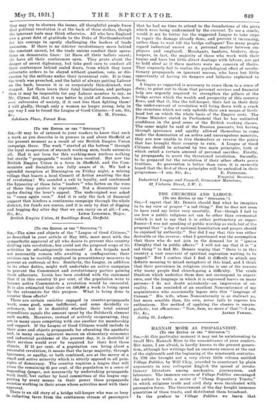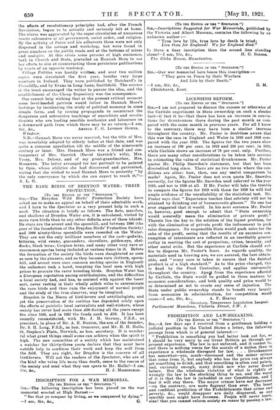HANNAH MORE AS PROPAGANDIST.
[To THE EDITOR OF THE " SPECT1TOR."3 Sin,—At this particular moment it may not be uninteresting to recall Mrs. Hannah More to the remembrance of your readers. Her name, I am afraid, is hardly known to the present genera- tion, although her writings had an enormous success at the end of the eighteenth and the beginning of the nineteenth centuries. In 1792 she brought out a very clever little volume entitled Village Politics, by Will Chip, intended to counteract by plain arguments in easy colloquial English the spread of revolu- tionary literature among mechanics, journeymen, and labourers. The immense success of Village Politics encouraged the author to write a series of "Cheap Repository Tracts." in which religious truth and civil duty were inculcated with persuasive force. The Government of the day bought immense quantities of these tracts, and distributed them broadcast.
In the preface to Village Politics we learn that the effects of revolutionary principles had, after the French Revolution, begun to be actually and seriously felt at home. The alarm was aggravated by the eager circulation of numerous tracts subversive of all government, social order, and religion. By the activity of Paine and his adherents these were not only dispersed in the cottage and workshop, but were found in great numbers on the public roads and at the bottoms of mines and coal-pits. At this crisis some persons of high eminence, both in Church and State, prevailed on Hannah More to use her efforts to aim at counteracting these pernicious publications by tracts of an opposite tendency.
Village Politics was hastily written, and over two million copies were circulated the first year, besides very large numbers in Ireland. They were published by Hatchard's in Piccadilly, and by Evans in Long Lane, Smithfield. The success of the tract encouraged the writer to pursue the idea, and the establishment of the Cheap Repository was the consequence.
One cannot help wishing that at the present critical moment some level-headed patriots would follow in Hannah More's footsteps by inculcating the study of political economy in some simple form, and by issuing propaganda to counteract the dangerous and subversive teachings of anarchists and revolu- tionists who are leading sensible mechanics and labourers on a downward path from which there may be no return.—I am,
Sir, &c., ARTHI7R F. G. LEVESON GOWER. Windsor.
N.B.—Hannah More was never married, but the title of Mrs. was invariably adopted by elderly ladies at that date, and was quite a common appellation till the middle of the nineteenth century or later. Mrs. Hannah More was a friend and con- temporary of Mrs. Garrick (David Garrick's wife), Mrs. Vesey, Mrs. Delany, and of my great-grandmother, Mrs. Boscawen. The latter arranged for her portrait to be painted by Opie, whose abilities she had discovered and patronised, saying that she wished to send Hannah More to posterity "by the only conveyance by which she can expect to reach it"— A. L. G.



































 Previous page
Previous page